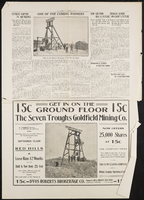Search the Special Collections and Archives Portal
Search Results

Transcript of interview with Dr. John Shepherd by Lisa Gioia-Acres, November 21, 2008
Date
Archival Collection
Description
Dr. John Richard Shepherd shares the background of his early life in southern Illinois, his father's and grandfather's occupations, and his educational journey through college and medical school. His army experiences in Chicago and Alabama convinced him and his wife to look for a warm dry climate in which to live, and they relocated to Las Vegas in 1968. Dr. Shepherd recalls the businesses and housing surrounding Sunrise Hospital, the difficulties getting his specialty listed in the phone book, and renting his first office space from Nate Adelson. He also describes taking out a loan to install ophthalmology equipment, hiring an office manager with medical accounting experience, and doing cataract surgery in a way that basically hadn't changed for decades. The passing of the Medicare bill back in 1966 caused Dr. Shepherd's practice to build up quickly. He details the many ways eye surgery changed, including the invention of the intraocular lens and the phacoemulsification procedure. He mentions his and Dr. Shearing's contributions to ophthalmology — better designed lenses and surgical techniques - which they taught to other doctors from all over the country. Dr. Shepherd discusses radial keratotomy, which was a precursor to laser and later LASIK surgery, and describes a lens implant technique he learned in Russia from Dr. Fyodorov. He goes on to share anecdotes and stories of his interactions with patients, his travels as a consultant and as a surgical teacher for Project Orbis, and meeting Fidel Castro. He speaks candidly about his successes and his failures as well. Dr. Shepherd retired in 2006 and immediately enrolled in a Master's program and earned a degree in military history. After a long and distinguished career, after receiving many accolades and awards, he and his wife are enjoying life, splitting their time between Sun Valley, Idaho, and Las Vegas.
Text

Al McDaniels interview, February 28, 1980: transcript
Date
Archival Collection
Description
On February 28, 1980, Rodney Goosby interviewed Al McDaniels (b. 1940 in Muskogee, Oklahoma) about his life in Las Vegas and his career as an athletic coach. McDaniels, referred to as Coach by Goosby, speaks primarily about his time as a coach for track and field at the University of Nevada, Las Vegas, his community involvement and the city’s recreational activities. Moreover, McDaniels speaks about his education and his current research as he works on a doctoral degree in physical education. Lastly, he talks about the city’s growth and the move from empty desert spaces to housing and shopping center constructions.
Text
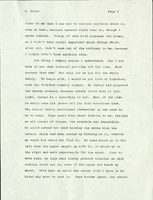
Chapter from autobiography by Bella Stern, 1980
Date
Archival Collection
Description
In this chapter, Stern describes her upbringing in Russia and fleeing to Poland. It is accompanied by a letter to the publishing company William Morrow.
Text

Gene Noboru Nakanishi oral history interview: transcript
Date
Archival Collection
Description
Oral history interview with Gene Noboru Nakanishi conducted by Ayrton Yamaguchi, Cecilia Winchell, and Stefani Evans on April 2, 2021 for Reflections: The Las Vegas Asian American and Pacific Islander Oral History Project. Gene Nakanishi shares his detailed family history from both his father's and his mother's families. He discusses his paternal grandfather's work on the Union Pacific Railroad, the family's internment in Wyoming during World War II, and his father's release from the camp by joining the United States Army Signal Corps. Nakanishi also talks of his maternal grandfather who was of the Bushido ("warrior") class in Osaka, Japan, and his grandfather's work with Christian missionaries. He shares details of his mother's restaurant employment in Los Angeles and her opening of Osaka Japanese Bistro in Las Vegas in 1969. Nakanishi also talks about being born and raised in Las Vegas, his musical schooling at Berklee College of Music in Boston, and his graduate education at Harvard University. He discusses his work as a band teacher for the Clark County School District, his involvement in the Idyllwild Arts Summer Program band camp, and his interests in jazz music.
Text
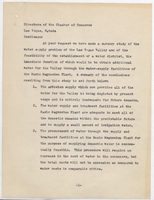
Letter from Alfred J. Ryan to the Directors of the Las Vegas Chamber of Commerce, circa 1950
Date
Archival Collection
Description
Discussion of the feasibility of bringing water from Lake Mead to Las Vegas. Pittman is an older name for the city of Henderson. Whitney is an older name for East Las Vegas.
Text
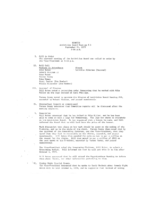
Meeting minutes for Consolidated Student Activities Board, University of Nevada, Las Vegas, September 25, 1978
Date
Archival Collection
Description
Text
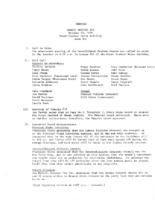
Meeting minutes for Consolidated Student Senate, University of Nevada, Las Vegas, October 10, 1978
Date
Archival Collection
Description
Text
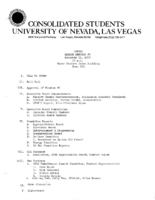
Meeting minutes for Consolidated Student Senate, University of Nevada, Las Vegas, December 21, 1979
Date
Archival Collection
Description
Text
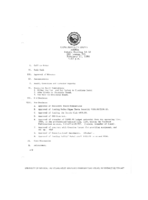
Meeting minutes for Consolidated Student Senate University of Nevada, Las Vegas, Febraury 20, 1986
Date
Archival Collection
Description
Text

